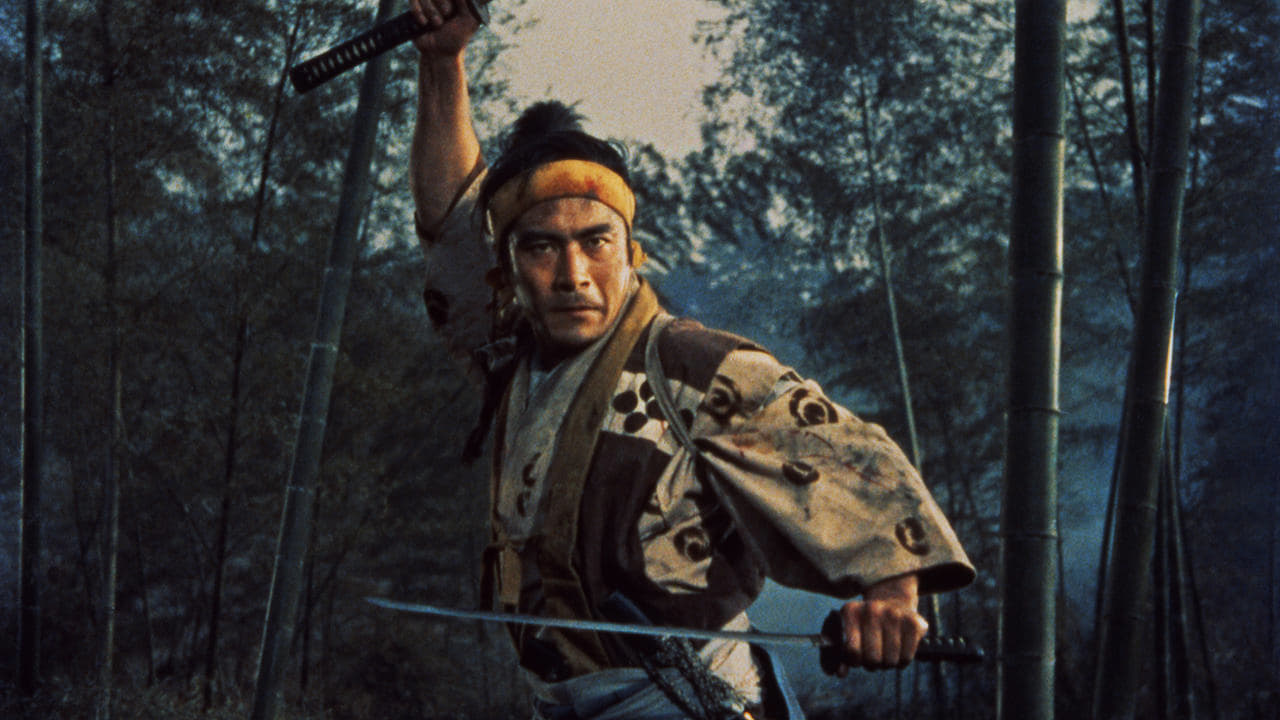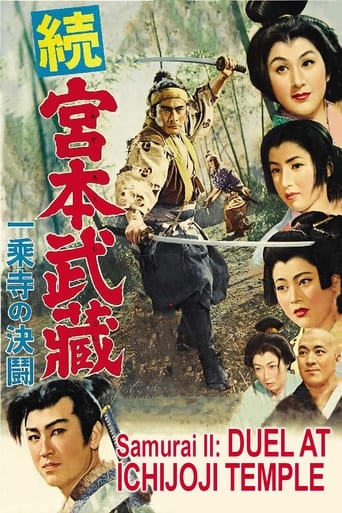



Let's be realistic.
Amateur movie with Big budget
It’s an especially fun movie from a director and cast who are clearly having a good time allowing themselves to let loose.
View MoreOne of the most extraordinary films you will see this year. Take that as you want.
View MoreThe first part of the trilogy was setting up the story, visually resplendent but leaves you out in the open. In this second part the direction is solidified. Musashi is set up to choose between the way of the sword or love for the girl Otsu, while having to face his nemesis, foreshadowed for the closing chapter. What puts me off this second chapter, which I rate the lowest of the three, is that we had a set of characters in the first film, and suddenly we have another set of characters. The film revolves around his feud with the Yoshioki school.So in a way, this loose narrative foreshadows the third chapter. As it emerges in this second film, the film is not one long epic split in three parts. Neither is each of these first two films self-enclosed. The narrative is a loose stitching together of episode and digress, thrust and feint in many directions; observant viewers will notice the same in the elliptical shooting mode.I will not say more about this as a film since we are still halfway there, instead let's look at some context around the film, here on the fluidity of self.--This is a core precept of Buddhism, which features prominently in the films; Musashi receives key lessons by monks, his journey is one of self-realization, internal abating of ego.This fluidity is seen in the transmission and establishment of Buddhism in Japan over several hundred years through several attempts, several travels of Japanese monks in China. Both notable Zen schools in Japan were initiated by monks of the Tendai sect who had been to China. The film's main two centerpieces take place outside Buddhist temples (one is referenced in the title, the other is Sanjusangen-do), both belonging to Tendai. The Sanjusangen-do, a marvelous structure, is also famous for housing one thousand and one statues of the thousand armed Kannon, the boddhisatva of compassion. The little wooden statuette that Musashi is seen carving in spots is of Kannon.Now simply saying that the self is illusory sounds weird, metaphysical or philosophical at best. Buddhists have many of the same lofty words as we do, about 'void' and 'self', but whereas we're accustomed to theoretical construction and analytical philosophy (we love words in the West), they resort to words as a last means of describing a practice—also evident in Musashi's own writings where he stresses experiential appreciation.So when they say 'void', they don't mean a generality but something which can be felt, has been felt, as one feels the temperature of water. When they say 'self', they mean when a single thought arises while you're washing the dishes.It's a pain in the ass to talk of it, because how can you say exactly how warm it is? It either is to you or isn't. Stick your hand in. Zen Masters (as well as Musashi whose 'Way of strategy' is Zen-flavored) knew this, which is why they loved paradox, urged silence or beat and kicked their students when they asked logical questions. The point is to know for yourself. A similar thing happens to Musashi in the first film when he is tied by a Zen monk from a tree, a fictional event.This monk, Takuan, existed; though his interactions with Musashi in the film are fiction, presumably he did know Musashi. He wrote on this business of illusion and nonself using sword metaphors, because the writings were intended for Yagyu Munenori, sword instructor to three shoguns and with Musashi the most famous swordsman in his day. Munenori briefly appears in the third film.Munenori and Musashi both wrote books with background in all this. Both are still being widely read in the martial arts and business worlds, by people looking for insights on real or metaphorical war.Musashi's first four books comprise technique and strategy. The last one and shortest, Book of the Void, which is held in separate esteem, probably because of the portentous title, is where Musashi speaks of the Zen void as deeper principle—it should be the most interesting but isn't, Musashi's practical conveyance falls short. No, it's the books on strategy that deserve study once you look past hand-to-hand combat, at least for our purposes here.Suffice to say, both Zen and Musashi urge direct observation of mind instead of general reasoning. Suffice to say, from the perspective of Zen a Kannon statue is no more sacred than the piece of wood it was carved from. And that the act of carving is the manifestation of self, this can be practically observed in the carved image—is it sloppy, elegant? This is important. So neither spoken word, nor teachings in a book, nor sacred image, nor Zen or not Zen, but observation of the mind behind. I'm going to wrap this in the third post.
View MoreOK. First of all, I am huge Toshiro Mifune fan. I am also a huge...and I mean huge Musashi fan. And lastly I have seen plenty of Samurai films. But I have watched Samurai 2: Ichijôji no kettô twice now, and I just can't stomach it. It is perhaps one of the most clichéd samurai films I have ever seen. The story seems to be based on the mystical Miyamoto Musashi, rather than a more realistic character. In addition, there is so much thick, syrupy melodrama and love triangles that it really hinders the story from flowing well. Not to mention it often takes away energy from some of the action scenes.Mifune really makes this film bearable. Koji Tsuruta as Kojiro Sasaki is also outstanding and commands plenty of respect on screen. However, some of the other actors are mediocre at best.There is much to be said about old Samurai cinema, and the way they glorified and really elevated these noblest of warriors. But Ichijôji no kettô just covers it in a thick melodramatic goo and wraps it in toilet paper.In addition, the film has very bad lighting, plenty of anachronisms, continuity problems and poor editing. Once again, Toshiro Mifune as Miyamoto Musashi is my personal hero, Jesus Christ, Lord and Savior...but was there ever! a less fitting movie for this cinematic giant.RE-MAKE!
View MoreMy view of this early Musashi trilogy is strongly coloured by the far-superior 1960's series of five. The first in this 1950's trilogy was a shattering disappointment. With Japan's greatest actor playing one of Japan's greatest folk heroes, how could you miss ? Well, the first one was flat. The pace was slow, and Mifune's exploding energy was kept well under control. Shame ! This second instalment corrected many of the problems of the first. The action is staged much better (with one caveat : see below), Mifune gets to be ferocious, as well as express a range of other emotions, including something close to love. The story is a bit disorienting, as it shows events in a different order to the 1960s series, but it still works well. The women throw themselves at our hero at a much faster rate, which gets things moving along nicely.Nevertheless, I have marked down this movie significantly for the incredible stupidity of setting most of the action scenes in the dark. Director, what were you thinking ?! Instead of having the duels at six in the morning, move them to seven or use a moonlit night. Hell, what a waste.
View More"Duel at Ichijoji Temple" is one of the greatest samurai films I have seen. It is the second part of the trilogy about Japan's most famous and arguably greatest swordsman Miyamoto Musashi, author of the book "Five rings". Mifune is again superb as the lone wolf hero who is torn between his love to the orphan girl Otsu and his own samurai call. Koji Tsuruta was unknown to me before this and was a pleasant surprise as the charming, ambitious and cunning Kojiro Sasaki, who later becomes Musashi's principal rival. Daisuke Kato, one of the Seven Samurai, makes a fun appearance as one of the most loathsome characters in the movie and the trilogy.The actresses playing Akemi and Otsu were quite impressive as well.Hiroshi Inagaki was a highly capable director and proves that clearly here. His attempt to cross swordfighting action with melodrama works very well. The photography is excellent and is one of the real treats of this movie. The scenery was even more spectacular in the third film, but here it doesn't disappoint either. The ending might disappoint those waiting for a happy end and to see Musashi and Otsu get together at last. It is a bit of a letdown, but it also makes you more eager to see the third and final part. There is nothing to criticize here, those who do are missing the point and shouldn't have seen the film in the first place.10/10
View More